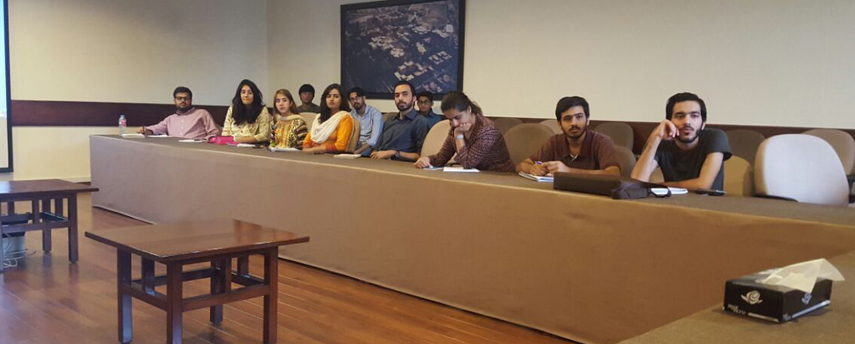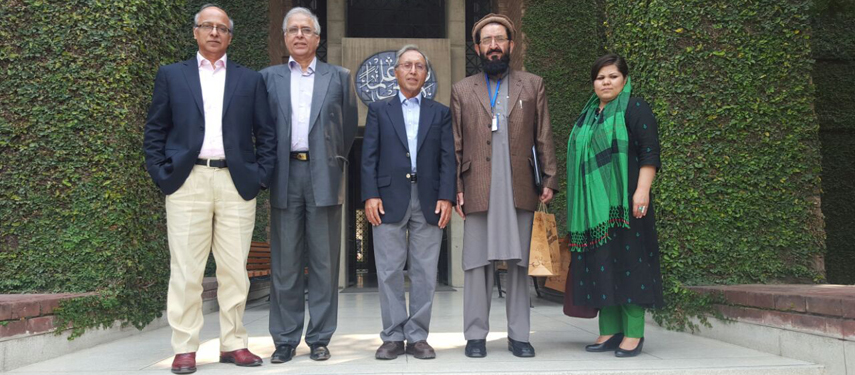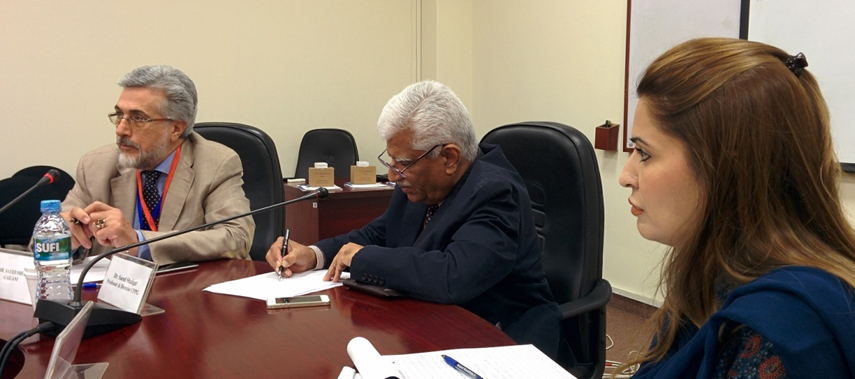During the visit to Lahore as part of outreach and university interaction planned for the track 1.5/II project Beyond Boundaries, selected members of the Pakistan Afghanistan Joint Committee visited LUMS and FCCU on Tuesday 20 October, 2016. The interactions at both universities focused on Pak-Afghan bilateral relations on the topic of: “Rationalizing discourse on Pak-Afghan Relations: Is a Reset from Acrimony to Amity possible”.
At LUMS the Pakistani group was represented by Mian Sanaullah, former ambassador, while the Afghan side was represented by Abdul Hakim Mujahid, head of executive council of the High Peace Council, and Wazhma Frogh, senior advisor to Defense Minister, while CRSS and WPSO representatives also participated. The faculty members and about 25-30 students attended the presentations by the two sides at the Department of Humanity and Social Sciences.
Abdul Hakim Mujahid while giving his presentation pointed out that the harsh attitude towards Afghan refugees has created a lot of problems and acrimony in Afghanistan.We hope the Pakistanis don’t want to destroy the 35 years of hospitality, and the goodwill it generated, by pursuing policies that have created more problems than solving them. While, Wazhma Frogh said that the Afghan delegation was here to initiate and promote a rational discourse on the two countries. She informed the students that in the post 9/11 Afghanistan, as many as 9 million children are going to schools and that nearly 27 percent members of the parliament are women. It is a huge step forward for a male-dominated country.
Mian Sanaullah expressed that any acrimony or distrust only affects people and traders of both countries, we should address these by developing better civil society engagement through academia and youth level mutual exchanges as well as dialogues like these. He said that the benefit of this acrimony was only to a small pool of vested interests.
At FCCU the Pakistani group was represented by Shazia Marri, Member of Parliament, and the Afghan side was represented by Sayed Ishaq Gailani, former Member of Parliament and Presidential candidate, while representatives of CRSS and WPSO also participated. The faculty members and about 35-40 students attended the presentations at the Center for Public Policy & Governance.
Ishaq Gailani in his presentation said that Afghanistan government’s decision of exiting the recent SAARC conference was unfortunate, it also coincidentally followed India’s decision to withdraw, which did not bode well. He said this move was ill-advised, and against the interests of Afghan people; it only helped create more bitterness. Speaking of recent peace negotiations between the Afghan government and the Taliban, he said the Taliban in Qatar did not represent the Taliban in Afghanistan in the least, therefore the violence and bloodshed continues. He said, unfortunately it seems “The blood of Afghans is very cheap”.
Shazia Marri commented on the need for continued engagement. Disengagement serves no one, and while you might not solve something every time, coming to the table and having a discussion is necessary to moving forward. She also said that the two countries needed to move past the official/military rhetoric and improve exchanges of academia, media personnel, and lawmakers and promote expanded cultural ties.
At both the universities the presentations were followed by an interactive, candid, and passionate discussion between the students and speakers through question and answer sessions. These sessions were aimed to foster better dialogue, understanding, and cooperation between civil society members particularly the young male and female students of the two universities.
University surveys were administered with the participating students and faculty members – post the lectures by PAJC members – to gauge the improvement in their perceptions on the other side, understanding of the challenges of Pak-Afghan bilateral relations, and awareness about the socio-political conditions in both countries.





